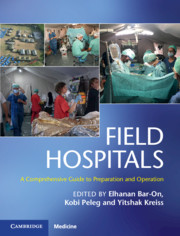Book contents
- Field Hospitals
- Field Hospitals
- Copyright page
- Contents
- Contributors
- Preface
- Section 1 History
- Section 2 Scenarios
- Section 3 Operational Considerations
- Section 4 Clinical Considerations
- Section 5 Additional Contextual Considerations
- Chapter 29 Forensic Medicine and Victim Identification in the Field Hospital Setting
- Chapter 30 Prehospital Care in the Disaster Setting
- Chapter 31 Long-term Deployment and Continuity of Care
- Chapter 32 Ethical Dilemmas in Field Hospital Deployments
- Chapter 33 Legal Issues in Field Hospital Deployments
- Index
- Plate Section (PDF Only)
- References
Chapter 32 - Ethical Dilemmas in Field Hospital Deployments
from Section 5 - Additional Contextual Considerations
Published online by Cambridge University Press: 09 January 2020
- Field Hospitals
- Field Hospitals
- Copyright page
- Contents
- Contributors
- Preface
- Section 1 History
- Section 2 Scenarios
- Section 3 Operational Considerations
- Section 4 Clinical Considerations
- Section 5 Additional Contextual Considerations
- Chapter 29 Forensic Medicine and Victim Identification in the Field Hospital Setting
- Chapter 30 Prehospital Care in the Disaster Setting
- Chapter 31 Long-term Deployment and Continuity of Care
- Chapter 32 Ethical Dilemmas in Field Hospital Deployments
- Chapter 33 Legal Issues in Field Hospital Deployments
- Index
- Plate Section (PDF Only)
- References
Summary
Disasters are inevitable. Health-care providers operating in disaster zones must make decisions that are unique and different from those encountered in their routine health-care work environment. Treatment decisions made under disaster conditions must reflect available resources. Clinical practice is mainly concerned with individuals while the focus of humanitarian aid is on populations. In the context of disasters with limited resources there might be a conflict between individual rights and community benefit. Teams operating in devastated zones should be aware that their health-care providers will become fully engaged with such dilemmas. Ethical issues should be identified, and individuals should be prepared to confront them. Preparedness to deal with these will allow: better medical care, higher ethical standards, and better accountability to patients. Awareness and identification of ethical issues will help health care personnel to alleviate some of the burden of confrontation with these expected issues. It is strongly recommended to organizations involved in humanitarian assistance to set clear international standards such as those by Sphere and the WHO and to train personnel to deal with these issues.
- Type
- Chapter
- Information
- Field HospitalsA Comprehensive Guide to Preparation and Operation, pp. 304 - 312Publisher: Cambridge University PressPrint publication year: 2020

